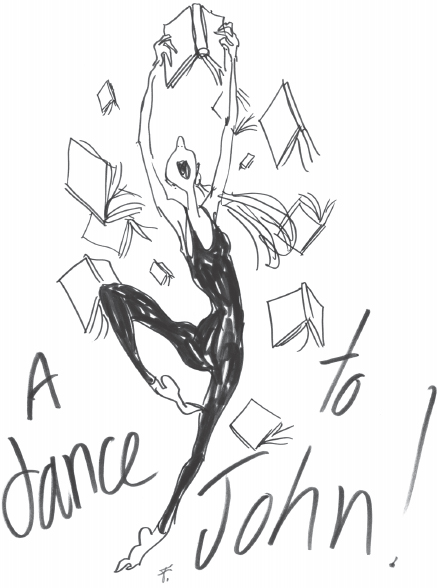

JOHN WAS A teller of stories. They popped up in articles and speeches, at the dinner table, outside on the deck in the sun. He had favorites he polished and told so often his family knew them by heart. He was proud of that family—proud of the children (daughter, Amy; son, Andrew; stepdaughter, Jen) and grandchildren (Tiana, Eli, and Oscar) and spoke often of their exploits, another piece of his storytelling. How he loved new ones, which was why he traveled so often, even though he was otherwise a man of routine who went no farther than his front stoop or back garden. And why he was such a good listener.
John hated all holidays, including his birthday—except Thanksgiving, when he wanted his family and friends around his kitchen table as he carved the turkey and sneaked a bite of skin, having insisted on my cooking extra legs and thighs so there would be enough dark meat. But he had a sense of ceremony and he taught me to celebrate milestones, whether a third-grade Prize Day or college graduations or the awarding of a Ph.D. Of course he was there within moments to exult in the birth of all three of his grandchildren.
The only possession he cared about was his house—a thirteen-and-a-half-foot-wide funky brownstone filled, naturally, with books.
He was a man of many passions: New York way up on the list. Moving around, he preferred subways to buses—he could tell you the best route to anywhere and where to stand on the platform to be closest to the exit at the other end of the trip—and preferred both to taxis. Although he grew up in southern California, John hated to drive, so failed to renew his license sometime in the seventies. He walked with hands in his pockets, even down stairs—I was always afraid he would trip and not be able to catch himself.
Sports—he would have loved to have been the new Red Smith. The Times gave him a sports column for a while, until he brought the CIA into a piece on a strike by the NFL (which they wouldn’t print) or the time he planned to cover a baseball game and a tennis tournament on the same afternoon but couldn’t find his limo at Forest Hills when he was ready to go over to Shea Stadium (not sure if they ran that story).
Actresses with smoky voices—Blythe Danner, Susan Saint James, Dana Delany, Lauren Bacall. And a very few heroes: Adlai Stevenson, Murray Kempton, Joan Baez, and Bobby Kennedy are the only ones that come to mind.
As anyone who knew him will attest, his tastes were catholic—Mozart, to Candide, to Evita, to Fats Domino, to Springsteen, to “Suds in a Bucket.” He knew everything and forgot nothing from Sufi lapwings to parodies of Swinburne; he was a living database.
John worked in many venues, saying yes to every publication that asked him to write (including Penthouse and Playboy, although not Hustler), but, with the exception of First Edition (WGBH) and his sixteen-year stint on CBS Sunday Morning, resisted invitations to speak on television—to the consternation of program coordinators.
He was loyal and forgiving of his friends although he never called or wrote. He refused to write e-mails, let alone letters, to his mother, whom he dearly loved. As I loved him; John was one of my passions.
Okay, he wasn’t perfect: He loved gossip (reading Page Six and Liz Smith every morning) and could not be trusted with secrets; John was a blurter. He was stubborn and he ignored his health. He consumed nothing but coffee until dinnertime and smoked at least a pack and a half of cigarettes until the day they cut away 40 percent of his lung. It took three times in rehab and the destruction of more than one marriage to end his drinking. And he wouldn’t share the remote.
But he was a man of deep integrity and faithful his entire life to his one true religion: Never cross a picket line.
John is no longer here to tell his stories, so we must tell them for him. Let us begin.
—Sue Leonard
New York City, 2011